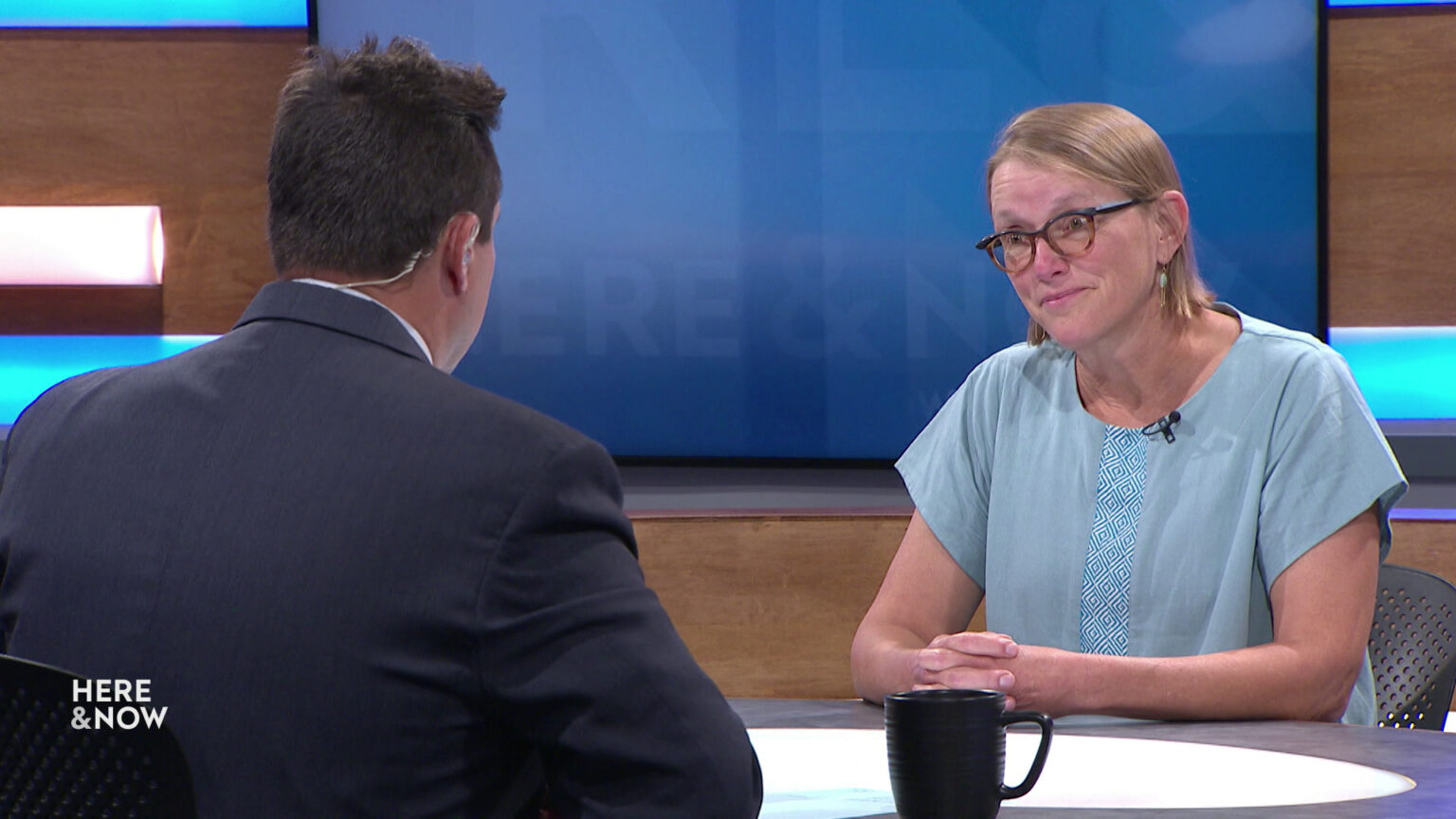'Here & Now' Highlights: Steve Vavrus, Pascale Manning, Louise Robbins, Laura Dresser
Here's what guests on the Sept. 8, 2023 episode said about climate extremes, UW-Oshkosh layoffs, an attempt to ban LGBTQ-related books at a public library, and the status of Wisconsin's workforce.
By Zac Schultz | Here & Now
September 11, 2023

Zac Schultz and Laura Dresser (Credit: PBS Wisconsin)
Wisconsin is setting new records when it comes to climate extremes, and climatologist Steve Vavrus considers whether the state is prepared for a new reality. UW-Oshkosh is facing an $18 million budget deficit and has announced layoffs and furloughs — Faculty Senate President Pascale Manning says it’s due to a lack of investment by the state. An anonymous group wants to remove books from the Iron River Public Library, and UW-Madison library sciences professor emeritus Louise Robbins shares a history lesson on past efforts to ban books in America. Unemployment is low and workers wages have gone up, but COWS associate director Laura Dresser explains there is a concern about the decline in the rate of women participating in the workforce.
Steve Vavrus
Co-director, Wisconsin Initiative on Climate Change Impacts
- The northern parts of Bayfield and Douglas counties were at the highest drought rating possible in the first week of September, according to the U.S. Drought Monitor, as was another area centered on Vernon County in the southwest part of the state. It marks the first time any place in Wisconsin has been in an “exceptional drought” in the 20 years the rating system has been in place. Vavrus says the scale may need to be reevaluated.
- Vavrus: “We have shifting baselines right now when it comes to climate that what would seemed ordinary or what may be seeming more ordinary in the future would have been considered extreme years ago.”
Pascale Manning
President, UW-Oshkosh Faculty Senate
- UW-Oshkosh is the next in a line of UW System schools to announce a budget deficit, joining UW-Platteville and UW-Parkside. UW-Oshkosh has announced layoffs and furloughs to close the $18 million gap. As president of its Faculty Senate President, Manning says the cuts will be devastating.
- Manning: “The impacts have the potential to be catastrophic in our community. Of course, they’re going to have reverberations across the entire campus from the classroom to every other corner of this hugely diverse organism that is our university. And they’re going to be felt in the wider community. You mentioned 20% of our workforce, but that just accounts for the layoffs. We have an additional projected approximately 100 voluntary retirements that are part of this loss that we’re estimating in the coming months. So taken together, if we’re looking at somewhere in the neighborhood of 300 people leaving our community, that’s 30% of our workforce. It’s hard to imagine what the university will look like, but it will look different.”
Louise Robbins
Library and information sciences professor emeritus, UW-Madison
- An anonymous group sent a letter to the Iron River Public Library, located in Bayfield County, asking for the removal of books related to LGBTQ+ topics. This effort is one of multiple campaigns to ban books in Wisconsin and around the nation. While the library said it wouldn’t remove the materials, the library board president canceled a planned interview while they “gather more facts” about the group behind the request, which organized a community meeting on Sept. 6. Robbins, a UW-Madison professor emeritus of library science, has studied past efforts to ban books.
- Robbins: “It’s been going on for a long time. I think some of the most prominent examples are during the McCarthy period during the ’50s. There was a large group of attempts to censor books related to communists, but also to people of color. … They wanted to ban cheap paperbacks and comic books. One person testifying before a congressional committee said comic books will blow your boys brains out. So they were rather alarmist about the effect of such things. But the targets were people of color, Jewish people, and non-binary people then, too. And then in 1958, for example, a book called The Rabbit’s Wedding, a children’s book with a black bunny and a white bunny, nearly caused the firing of the state librarian of Alabama, Emily Reed, because the state said it promoted interracial marriage. There was a group in the ’90s called Family Friendly Libraries who attacked pretty much the same topics like today’s Moms for Liberty.”
Laura Dresser
Associate director, COWS | High Road Strategy Center
- The State of Working Wisconsin 2023 report from the COWS | High Road Strategy Center at UW-Madison shows low unemployment in the state, but a decline in the participation rate of women in the workforce. Dresser said the issue is connected to the battle between Gov. Tony Evers and legislative Republicans over child care subsidies.
- Dresser: “Having watched child care for so long, I think that the sector requires public investment. We have massive public investment because children are a public good once they get to school, right? We all agree that we’re building the future and we all invest in schools. That’s how we have job quality in the schools and teacher quality in the schools that can really sustain decent jobs. But at the level of early care and education, the wages tend to be very low. And parents, especially parents in jobs that pay less than the median wage — half of the workers earn less than the median wage — have a really hard time meeting the cost of care. So that takes a public investment. So right now we have a largely private solution, and states that are taking on more and more public investment are getting that kind of system that can really support women’s work.”
Watch new episodes of Here & Now at 7:30 p.m. on Fridays.
 Passport
Passport











Follow Us